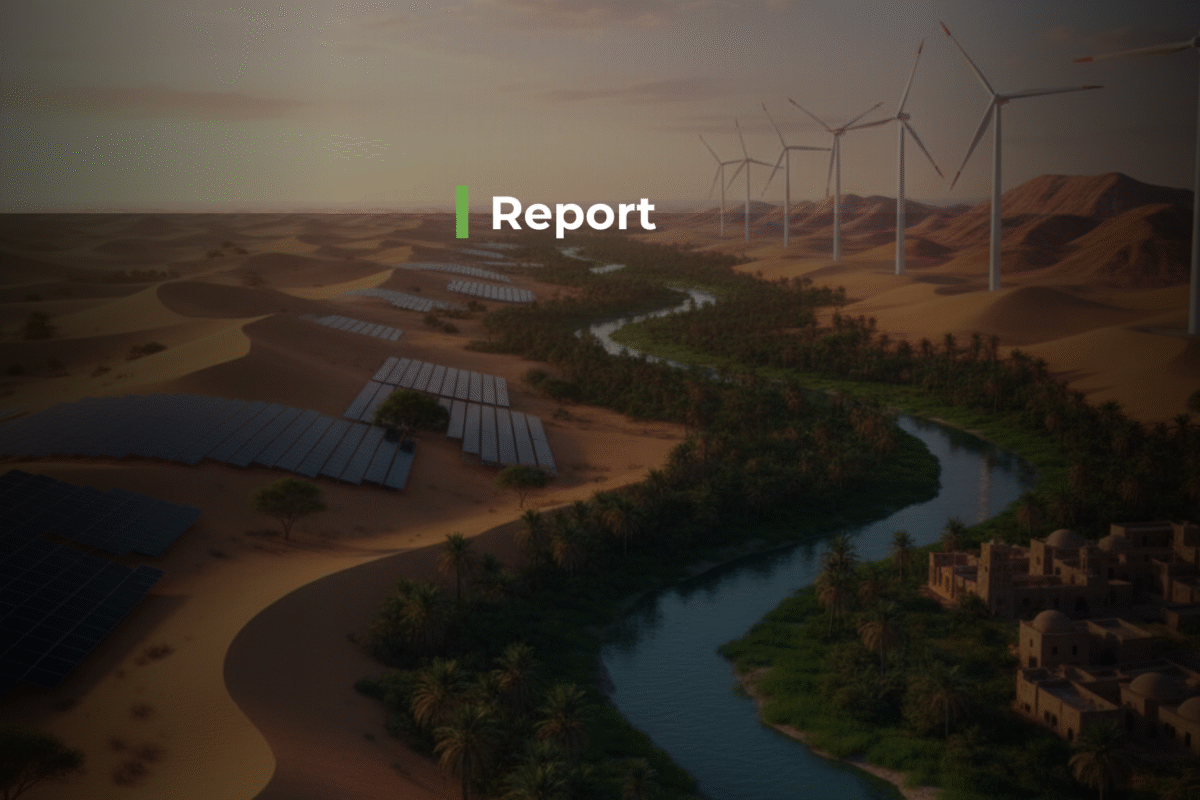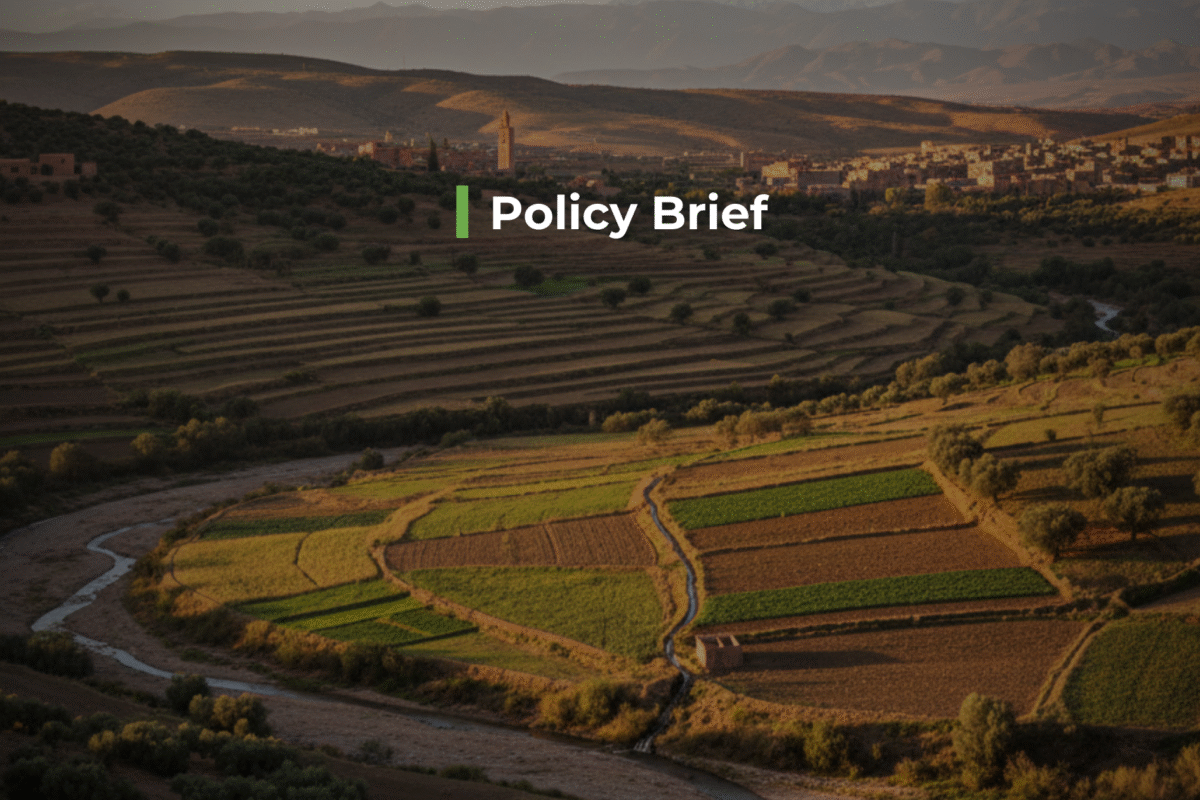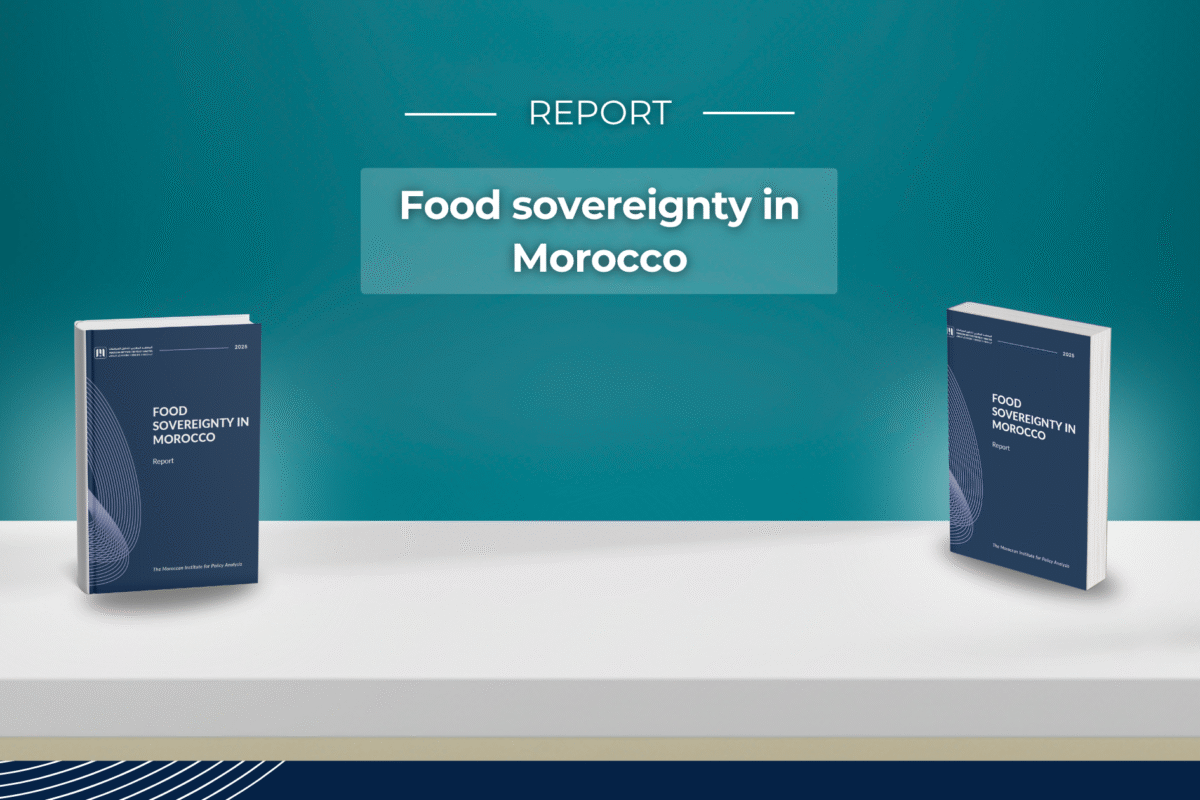The current fiscal system in Morocco could be effective provided that the beneficiary sectors or people are targeted, and that the necessary impact studies are carried out before decision-making.
POLICY BRIEF
Moroccan Policy Dialogue 2021/2022
Authors: Dr. Hajar Idrissi; Dr. Mohamed Masbah
Key Recommendations:
- Simplifying the language of fiscal and legal arsenal to make it accessible and understandable.
- Building monitoringand evaluation systems to improve government performance.
- Enhancing access to and sharing of data on fiscal and tax systems, policies, and services and the digitalization of tax administration.
- Promoting staff training and education, particularly through initial training of new recruits for an effective tax administration.
- Enforcing the rationalization of budgetary choices to address fiscal imbalances.
- Investing in scientific research to increase financial illiteracy.
Introduction
Morocco has implemented reform measures to reduce the fiscal imbalances, increase the fiscal asset and restore the sustainability of the government’s finances. Recently, the 2021 Finance Bill comes into play in a particular international context marked by an unprecedented health crisis generated by the Covid-19 pandemic which has impacted both developed and emerging and developing countries, with heavy squeezes on GDP in the first half of 2020.
In the framework of tax reforms, King Mohammed VI chaired a Council of Ministers, in which a founding text relating to tax reform in the form of a framework bill was approved. Prepared in the application of the High Royal Directions and on the basis of the recommendations of the National Conference on Taxation held in May 2019[1], this project aims to establish an efficient, fair, equitable, and balanced tax system, which consolidates the constitutional principles of tax fairness and the universal principles of good fiscal governance and makes it possible to mobilize all fiscal potential to finance public policies, promote economic development and achieve social inclusion and cohesion.
Additionally, the New Development Model emphasizes the importance of making the tax system more equitable by significantly broadening the tax base through the fight against fraud and tax evasion, the streamlining of tax expenditures, and the integration of the informal sector. This Model is based on five structuring levers, among of which is developing a more effective fiscal policy, capable of mobilizing additional resources, whose potential is estimated at between 2 and 3% of GDP[2].
This policy brief aims to identify the strengths and shortcomings of the new framework bill while charting a way forward on how policymakers and tax administrators can collaborate in improving tax policies that lead to increased revenues and social integrity.
Background
In the context of the Covid-19 global crisis, drought, and the Russian war on Ukraine the government of Morocco demonstrated remarkable responsiveness on both the health front and at an economic and financial level. The first reaction of the public authorities following the outbreak of this crisis was the creation of the Economic Watch Committee (CVE) at the level of the Ministry of Economy, Finance, and Administrative Reform. Composed of representatives of the government, civil society, and the banks, the Economic Watch Committee (CVE) is responsible to discuss and take the necessary measures to mitigate the economic and social impacts of the pandemic. It has set an action plan with a series of measures, including fiscal measures that can be classified according to the following: allowing companies with a turnover of less fewer than 20 million dirhams, who wish to benefit from the deferral of tax returns and payments, from March 31 until the end of June 2020[3]; supporting workers through the suspension of loans and monthly payment allocation of 2000 Dh; the postponement of deadlines for personal income tax returns and the exemption from income tax on the additional allowances paid to employees affiliated to the social security system (CNSS) by their employers; Financing companies in difficulty, through the establishment of the financing mechanism “Damane Oxygene” which is a guarantee product set up by the Caisse Centrale de Garantie (CCG) aimed at the coverage of an exceptional overdraft of 95%, for the benefit of small and medium-sized enterprises and companies with a turnover of between 200 million and 500 million dirhams.
The 3rd national conference on taxation took place on Mai 2019 and set the founding principles of a new fair and just fiscal system that Morocco has to implement to ensure that all citizens contribute to the public expenses according to their financial capacities, as explicitly stated by article 39 of the constitution. In this regard, the participants representing the Ministry of Economy and Finance, the general confederation of Morocco’s companies (CGEM), labor unions as well as various experts agreed on a list of recommendations[4] to guarantee the fundamental rights of both taxpayers and the tax administration.
Worth mentioning that few days before the conferences, in collaboration with other civil society organizations, Oxfam produced a memorandum[5] about tax justice in Morocco where civil society tax propositions were summarized.
The adopted recommendations during the conferences aim at extending the fiscal base and reducing the tax pressure; streamlining the tax incentives to end those bringing no concrete positive effects; ensuring social cohesion by overtaxing the increased land value and non-productive assets; and reallocating a share of VAT to the universal medical coverage. The exhaustive list also targeted local taxation regime, the integration of the informal sector within the formal economy, the digitalization of the fiscal procedures, etc. However, the participants failed not only to include a recommendation to tax the wealth as it was the case in 2013 during the 2nd national conferences on taxation[6] but also to stress the importance of a solidarity tax, which the government ended up implementing anyways during Covid19 crisis on both companies and employees.
In July 2021, a Fiscal Framework Law[7] (FFL) was adopted as a legal reference to translate the recommendations made during the 3rd national conferences on taxations into binding legislative measures. The FFL listed among its priorities (art-2) and fundamental objectives (art-3) reinforcing social and economic justice, reducing inequalities, streamlining tax-incentives, grouping all local taxes into only two categories (land vs activity), combating tax fraud and evasion., etc. Moreover, to make sure the FFL’s provisions enter into force in a reasonable timeline, article 19 required the implementation of all the provisions related to VAT, PIT and Corporate Income Tax (CIT) (art-04), local taxation (art-09) and para-fiscal levies (art-13) during a period of 5 years (2022 – 2026) following the entry into force of the FFL. Unfortunately, considering this deadline, 2022 finance law project has not marked a turning point in Morocco’s fiscal system. As no mega changes are being introduced at the parliament so far[8], a serious question is being raised: How possible and/or willingness is to respect the legally binding 5-years deadline to implement the radical fiscal changes listed in the FFL’s articles 04, 09 and 13 by 2026?
- Simplifying the language of taxation and legal arsenal to make it accessible and understandable.
Simplicity is an important attribute for a fiscal and tax system. The benefits of simplicity are generally to reduce the burden of administration and probably improve the willingness to comply with the tax system, thus generating more public support. Making the fiscal procurement laws, regulations and tax policies simpler and understandable and would probably reduce illegal tax evasion as some people do not pay taxes because they do not understand the tax laws. Simplifying the language should be an essential part of any part to improve the delivery of government services.
- Building monitoringand evaluation systems to improve government performance.
Monitoring and evaluation (M&E) are at the heart of sound governance practices. They are crucial for the achievement of evidence-based policymaking, management, budget decision, and accountability. Thus, it is necessary to encourage all interested stakeholders operating in the tax field to work together in the development of a core set of indicators that would support meaningful monitoring and assessment of capacity improvement in tax administrations and other revenue-related areas. This is crucial to increase the effectiveness of the fiscal policy, reduce corruption risks and also build support for other reforms.
- Enhancing access to and sharing of data on fiscal and tax systems, and the digitalization of tax administrations.
Public access to information is a legal requirement in Morocco. According to Article 27 of the Moroccan Constitution (2011), citizens have the right to access information retained by the public administration, elected institutions, and public service bodies. Morocco enacted the Framework Law 31.13 (2018) to define the scope of the public’s right of access to information. Thus, enhancing access to and the sharing of data on fiscal and tax systems is thus important, although such decisions should be balanced with considerations of data privacy and security, among others. Additionally, data sharing enhances fiscal transparency and fairness. Taxpayers care about knowing that the collection system is fair and that evasion is effectively tackled, as well as whether revenues are used in areas that they value. Consequently, this process can drive better tax policies and offer opportunities to reduce inequalities through a fairer allocation of the tax burden among citizens. Digitalization and new technologies also provide opportunities to increase efficiencies and save costs in public financial management. However, true tax digitalization is not only about converting paper forms into PDFs to upload on. The process has to be revolutionary, considering not only how taxpayers complete their filings, but what is taxed, and how the authority can leverage powerful data pipelines to complete and audit taxes without a filing being made. For example, Direction Générale des Impôts should develop local communication channels through social networks, in order to maintain an interactive relationship with its partners and to be as close as possible to their concerns.
- Promoting staff training and education, in particular initial training of new recruits for an effective tax administration.
The need for properly and highly trained staff to meet the new challenges of the Tax Administration has been confirmed and recognized. Enhancement of the human resource management of the Tax Administration through systematic and continuous staff training is the most common means of enhancing tax administration capacity and an important indicator of tax administration capacity building in a jurisdiction. Training can help tax officials upgrade knowledge and capabilities needed for current and future work on the basis of a training implementation program which takes into account the training needs of the tax officials with a view to improving their technical and social skills.
- Enforcing the rationalization of budgetary choices to address fiscal imbalances.
The deterioration of public finances in Morocco is a fact that is difficult to conceal. All the lights are red, revealing worrying signs of imbalance negatively impacting Morocco’s social growth. Each time the budget deficit worsens, the tax comes to the top of the proposals as the only tool capable of bringing profound solutions to this state of affairs. To achieve an optimal tax return and balanced budget, Morocco needs to broaden the tax base through a reduction or banishment of all derogatory measures, mobilize resources, improve tax revenues, fight tax fraud and informal sector and promote budgetary control process dedicated specifically to tax expenditures.
- Investing in scientific research to increase financial literacy.
In the context of the knowledge economy, scientific research is a pillar of human development. The production and dissemination of research articles, theses, books, and essays provide an opportunity to increase financial literacy where people can process economic information and make informed decisions about financial planning, wealth accumulation, debt, and pensions; and offer promising clues to a wide range of challenges in the field of finance and fiscal system. Therefore, creating potential mechanism through which university labs cooperate with the public and private sector to produce evidence-based research in fiscal policies and management is needed for economic growth and productivity.
Conclusion
In Morocco, tax reforms have successively followed and the assizes used to assess progress have generated a recurrent deficit. Tax expenditures prove that the situation continues to deteriorate and therefore need to be rethought, in order to be able to adapt it to the social and economic changes that Morocco has experienced in recent years. Given the global trend, Moroccan public finances need additional resources to meet ever-increasing public costs. In this regard, it is important to point out that “any tax reform, relevant and efficient, must not destabilize the macroeconomic framework because, in the event of crises, social spending is the first to be subject to budget cuts, which once again poses the problems of inequity and inequality. In addition, the quality of public expenditure is the first source of legitimization of tax revenue with taxpayers. Finally, the current fiscal system could be effective provided that the beneficiary sectors or people are targeted, and that the necessary impact studies are carried out before decision-making.
Endnotes
[1]– Recommandations des Troisièmes Assises Nationales sur la Fiscalité: https://www.finances.gov.ma/fr/Pages/detail-actualite.aspx?fiche=4431
[2] The New Development Model. 2021. https://www.csmd.ma/documents/CSMD_Report_EN.pdf
[3] You can see: https://www.finances.gov.ma/en/Pages/detail-actualite.aspx?fiche=5069
[4] https://www.finances.gov.ma/Publication/dgi/2019/recommandations-assises-nationales-fiscalite-fr.pdf
[5] http://www.espace-associatif.ma/wp-content/uploads/2019/05/Memorandum_Assises_fiscales_24042019.pdf
[6] https://portail.tax.gov.ma/wps/wcm/connect/b17fb93c-f2bf-48ec-9065-e31023bd7caf/synthese_recommandations_assises_fr.pdf?MOD=AJPERES&CACHEID=b17fb93c-f2bf-48ec-9065-e31023bd7caf
[7] https://www.droit-afrique.com/uploads/Maroc-Loi-2021-86-reforme-fiscale.pdf
[8] 2022 Finance law is being discussed at the parliament before adopting the final version by December the 20th
MIPA Institute
MIPA is a non-profit independent research institution based in Rabat, Morocco. Founded by a group of transdisciplinary researchers, MIPA’s mission is to produce systematic and in-depth analysis of relevant policy issues that lead to new and innovative ideas for solving some of the most pressing issues relating to democracy.



